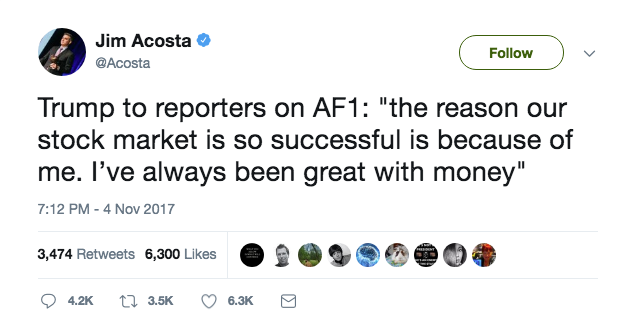March 23, 2005 by lonbud
The Man With The Plan
Even his most ardent supporters would hardly place George W. Bush among History’s original thinkers.
Whatever practical or political success to come the President’s way in this life certainly derives less from sleepless nights, deferred vacations, or wee-hour confabs with any brain trust, than from (not necessarily in any particular order) breeding, backroom influence, good timing, shrewd advice, and dumb luck.
Election fraud, too, but I’m not trying to open any old wounds here.
He’s been lately playing the folksy troubador, selling his scheme to “fix” Social Security on forays throughout the land -in the face of polls showing the public’s skepticism for his “idea”, as well as plain talk from Republican members of Congress that his plan is all but DOA.
But Mr. Bush is nothing if not tenacious, and he and the Republican Free Marketeers who back him have shown a willingness to say ANYTHING –even to tell outright lies– to gain the triumph of their will.
While his opposition, in both the press and from the public, has been tepid by historical standards, he’s managed to embark upon offensive war against sovereign nations, has employed torture and indiscriminate bombing against civilian populations, and threatens to bankrupt the nation’s domestic economy in the name of fighting “terrorism” and spreading “democracy” across the globe.
Now that the war on terror has been institutionalized, and amidst popular distractions like the Inquiry Into Steroid Use In Major League Baseball, Terry Schiavo’s Right To Live (Die?), the Michael Jackson pedophilia trial, and the tribulations of Tom DeLay, Mr. Bush seems wild-eyed with desire to make privatization of Social Security the hallmark of his term in office.
Just today, Treasury Secretary John Snow and the Trustees of Social Security moved to stoke the flames of public fear by announcing that new analysis projects the program to begin paying out more than it takes in even sooner than had been previously projected. Never mind that the new “projections” have Social Security running a deficit in 2041 instead of 2042, the import of the Administration’s public relations onslaught is that Social Security MUST be fixed NOW.
From whence came such an idea?
How is it that Mr. Bush suddenly has THE way to ensure security and comfort for older Americans in perpetuity, and that his plan needs to be put on the fast track for congressional approval lest we risk an inability to ever “fix” the “problem”?
It turns out he’s actually just recycling the approach authored by a former member of the Pinochet regime in Chile.
Barbara T. Dreyfuss, in the March/April issue of Mother Jones links the intellectual underpinnings of Mr. Bush’s plan for privatizing Social Security to the thought and work of Jose Pinera, Chile’s Labor Minister under the brutal dictatorship of Augusto Pinochet.
Now a paid consultant and author for the Cato Institute, Mr. Pinera was the architect of Chile’s failed private pension plan, begun in 1978, with his appointment to head the Labor Ministry. At the time, he wrote a new labor law for his country, guaranteeing for the first time “rights” to Chile’s long-oppressed workers, but which severely restricted their organizing, striking, and wage negotiating abilities.
Much like Mr. Bush’s plan to implement private -or as the P.R. campaign would prefer them referred to- “personal” savings accounts for American workers, Pinera’s plan in Chile was expensive, and was funded by slashing government programs, selling off state-owned resources, selling bonds to the new pension funds, and raising taxes.
In the end, more than half of the workers covered under Chile’s Private/State method must still apply for government subsidies to eke out a living in retirement, even after paying into their system for over 30 years.
Given we know the provenance of Mr. Bush’s “idea” for fixing Social Security, the costs of implementing it are as inescapable as the methods for funding them are predictable; and we have a fairly time-tested “projection” of the fruit such an idea will bear.
Will the American people be able to figure this one out?



Michael Herdegen - July 14, 2005 @ 6:53 am
Under the current SS system, most of America’s Boomers, after paying into the system for 40+ years, will find themselves eking out their lives in retirement.
SS outlays begin to exceed revenues somewhere around 2018, and after that, it’s up to the willingness of American taxpayers to pay ever-increasing amounts to retirees to prevent benefit cuts.
I predict that said willingness will be quickly exhausted.
lonbud - July 14, 2005 @ 1:45 pm
Anyone who has ever relied solely on SS payments after retirement has had to eke it out in their sunset years. I would never argue the government has the responsibility to completely take care of society’s retirees, and whatever the situation with SS may be now, it will obviously need revision as the demographics of our workforce and our retiree populations change in years to come.
Turning that reality into a multi-trillion dollar windfall for Wall Street and the financial services industry is a bad and cynical approach to the problem.
Michael Herdegen - July 14, 2005 @ 3:24 pm
How about private SS accounts that can only be invested in local, state, and Federal bonds ?
Michael Herdegen - July 14, 2005 @ 3:34 pm
Also, it wouldn’t be a “multi-trillion dollar windfall for Wall Street”, it would be trillions under management, of which Wall Street would get .25% annually, or about five billion a year in management fees.
lonbud - July 14, 2005 @ 8:31 pm
I don’t understand the fascination with private accounts of any stripe, and why should Wall Street get even a “measly” $5 billion annual windfall?
How about anyone with a $1 million net worth and/or an annual income in excess of $250K in the year preceding their retirement donating their SS pension to the larger society?
Michael Herdegen - July 15, 2005 @ 1:07 am
The point of private SS accounts is that currently, although the SS Administration credits “your” account with the contributions that you and your employer make, receiving benefits from the SSA is not a “right”, and Congress can, with the stroke of a pen, alter or even eliminate the benefits that you expect to receive, and you have no legal recourse.
Also, SS accounts currently have no right of inheritance. If someone were to pay into SS all of their lives, then drop dead at age 65, their heirs would get nothing, it would all go back into the public pot… Except for a surviving spouse, who would get a pittance.
With private accounts, SS would be more like a 401(k) or 403(b), if the worker dies early, the survivors get whatever’s in the account.
Rich people donating their SS benefits to society would be a good idea, IF it wouldn’t just get squandered. That’s the point of reform, to make the system inherently workable, and not just Jerry-rig it so that it can stagger on for a while longer.
Further, only about .3% of households have a net worth of $ 1,000,000 or more, and not all of those people are eligible for SS benefits yet.
It really wouldn’t make much difference.
lonbud - July 15, 2005 @ 8:15 am
Do you work for the Cato institute by any chance, Michael?
It’s called Social Security, and not Personal Security, for a reason.
America is the land of opprtunity, the country with the most freedom and the highest standard of living on the planet because of something I referred to in a previous comment, having to do with our collective sense of interconnectedness.
Social Security is a vehicle for all of us to ensure the least of us does not have to face the ravages and deprivations of old age alone and without means for support. Paying into Social Security is one of the prices we pay for the kind of society we enjoy.
Why should a wage earner’s child be entilted to his or her SS benefits? The child didn’t do anythng to earn them. Likewise, a surviving spouse has no inherent claim to such benefits, and beyond some transitional period should not need to depend on them for his or her support.
The inherent workability of the Social Security system has been quite clear since its inception and current “conservative” ideas for its reform are little more than transparent attempts to dismantle it all together. With changing demographics of the working and ageing populations, I think it’s high time we looked at “reform” from a means-testing, need-based angle.
Michael Herdegen - July 15, 2005 @ 3:57 pm
Why should a wage earner’s child be entilted to his or her SS benefits? The child didn’t do anythng to earn them.
Except for the opportunities forgone, and hardships endured, because the Federal government is taking 16% of their parents’ gross earnings and benefits.
You’ve spoken in other posts about how America’s “elites” arrange society and law to benefit themselves, at the expense of the common person. SS is one of those arrangements.
SS taxes are the most regressive taxes that the average person pays. Poor people can minimize sales taxes by doing without, or buying used, etc. No poor person can choose to contribute less of their minimum-wage paycheck to help support middle class retirement.
Paying into Social Security is one of the prices we pay for the kind of society we enjoy.
The inherent workability of the Social Security system has been quite clear since its inception…
I agree on both counts.
SS could work, and it should work. However, it’s been very badly mismanaged, and if the Federal government were a private corporation, what has been done would be criminal, and people would go to prison over it.
No Congress, whether Democratic- or Republican-led, has been able to resist spending SS contributions, and replacing the trust monies with worthless IOUs.*
The challenge now is to make the system secure going forward, and one crucial element of that is to ensure that Congress no longer has legal authorization to spend SS trust fund monies.
Social Security is a vehicle for all of us to ensure the least of us does not have to face the ravages and deprivations of old age alone and without means for support.
I think it’s high time we looked at “reform” from a means-testing, need-based angle.
I’m fine with doing away with payroll taxes, and converting the SS pension, disability, and medical insurance functions into formal welfare programmes, paid for out of the general fund. It would be more honest, at the very least. Not to mention less costly.
* Worthless because the Federal government has no means of raising funds to pay the IOUs with, except by increasing taxes on the very population that the IOUs will be paid back to.
It’s similar to setting up a “college fund” for one’s children, but taking the money out every month to spend on current expenses.
When the kid turns 18, there may be a bookkeeping entry crediting the child with a “college fund” of, say, $ 20,000… But no actual money.
The only way the parent can make good on the promised funds is to INCREASE THE RATE OF CONTRIBUTION, which, as it relates to the American taxpayer and the Federal government, means increased tax payments, to pay for what theoretically HAD ALREADY BEEN PAID FOR.
lonbud - July 16, 2005 @ 7:48 am
Well, yes, a conversation about the regressive nature of our tax system is certainly worth having. I’m glad, too, you recognize the inherent worthlessness of the dollar as fiat currency, and the huge problem associated with backing US government bonds by nothing more than our “full faith and credit.”
A couple of things, however: “poor people can minimize sales taxes by doing without…”
They can do without many things, and must, obviously. But they can’t do without things like food, clothing, transportstion, utilities –the raw materials of life. So we ought to consider sales taxes on those kinds of things.
if the Federal government were a private corporation, what has been done would be criminal, and people would go to prison over it.
except it’s not a corporation and IMHO many of the problems we have today stem from the Reagan-era notion that it ought to operate like one. On top of that, there’s plenty of actual criminal activity being engaged in by government officials that goes unpunished today, in addition to corporate criminality that’s ignored and even encouraged (unfunded pension obligations come to mind).